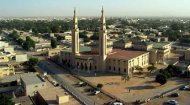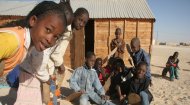Mauritania NewsExplore the latest Mauritania news and current events, the current state of press freedom in Mauritania, including government influence, legal threats, and the role of independent media. The main Mauritania news headlines are below however you can also read news from each African country by using the drop-down menu. |
Mauritania News |
Mauritania News |
Mauritania News | Mauritania News |
Explore all about the West African nation of Mauritania in a series of pictures, videos and images.
More >
|
|

|
While the constitution in Mauritania theoretically upholds freedom of expression and the press, successive governments have employed a range of tactics to exert control over information dissemination. In recent years, cases of censorship and harassment of journalists have provided stark examples of these challenges. Independent news outlets and individual reporters have faced pressure, including accusations of spreading false news and, in some instances, legal proceedings or outright harassment. The authorities have demonstrated a willingness to restrict critical reporting, particularly when it touches upon sensitive political or economic issues, making it difficult for journalists to operate without fear of reprisal. Beyond direct censorship, Mauritania's government, like many in the region, has increasingly utilised digital surveillance and social media regulations as tools for managing the media narrative. The increasing reliance on the internet for news means that controls exerted over online platforms can significantly impact public access to information. While specific instances of widespread internet blackouts are less common than in some neighbouring countries, the threat of such measures, coupled with monitoring of social media, contributes to a climate of self-censorship among journalists and citizens alike. The legal framework for press freedom in Mauritania, while present, is frequently undermined by the executive's interpretation and application of these laws. Laws designed to protect journalists are often bypassed or selectively enforced, while legislation that can be used to prosecute critical voices remains readily available. This dichotomy between enshrined rights and on-the-ground realities is a central feature of the Mauritanian media environment. The interplay between state-owned and privately owned media further shapes this landscape. State media, such as the Mauritanian News Agency (AMI) and national television and radio, generally align with government narratives. Privately owned outlets, like Le Calame or Essahraa El Madania, often strive for greater independence, but their precarious financial situations and vulnerability to governmental pressure can limit their scope. The limited number of truly independent and financially robust media organisations means that diverse perspectives can struggle to gain prominence, making it harder for citizens to access a comprehensive view of events. |







